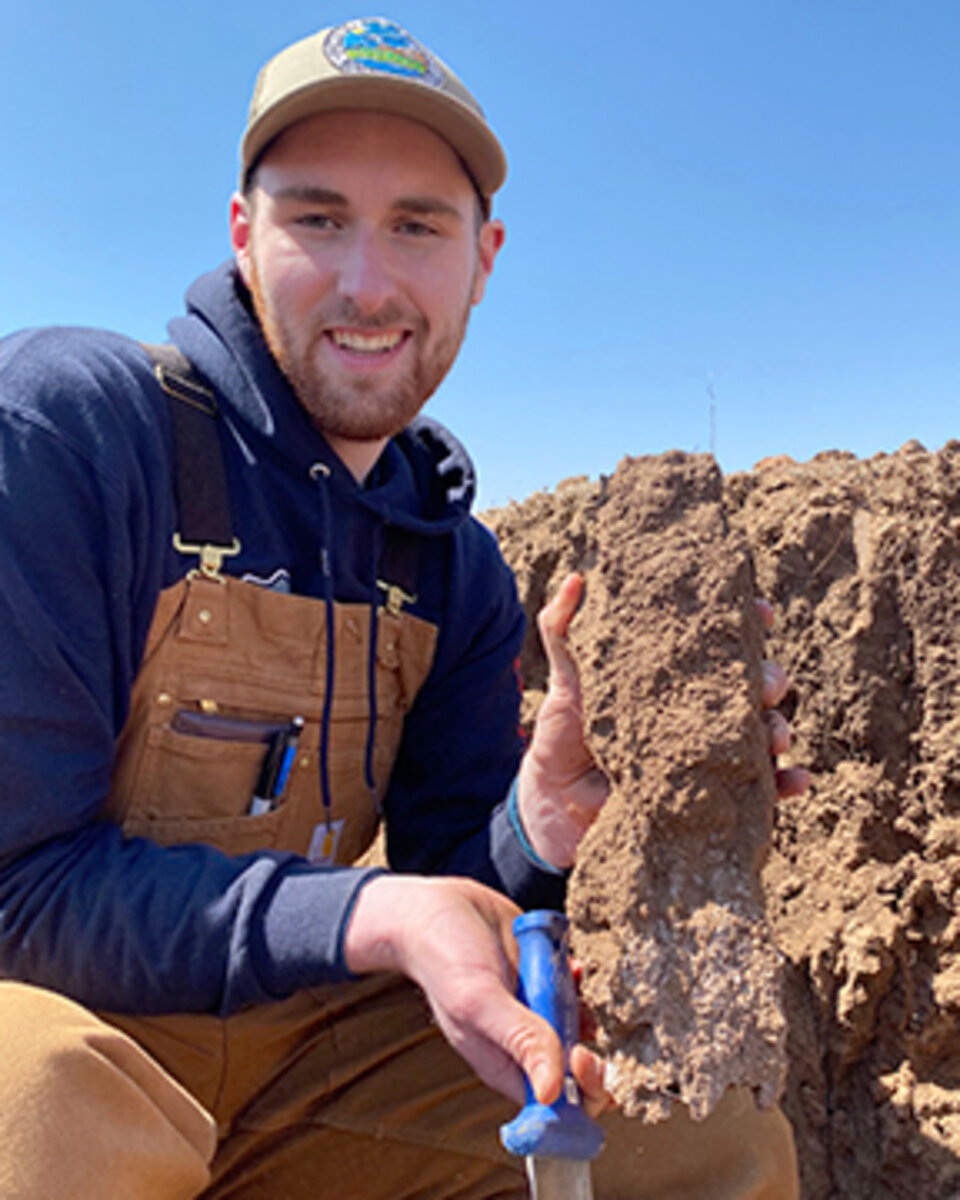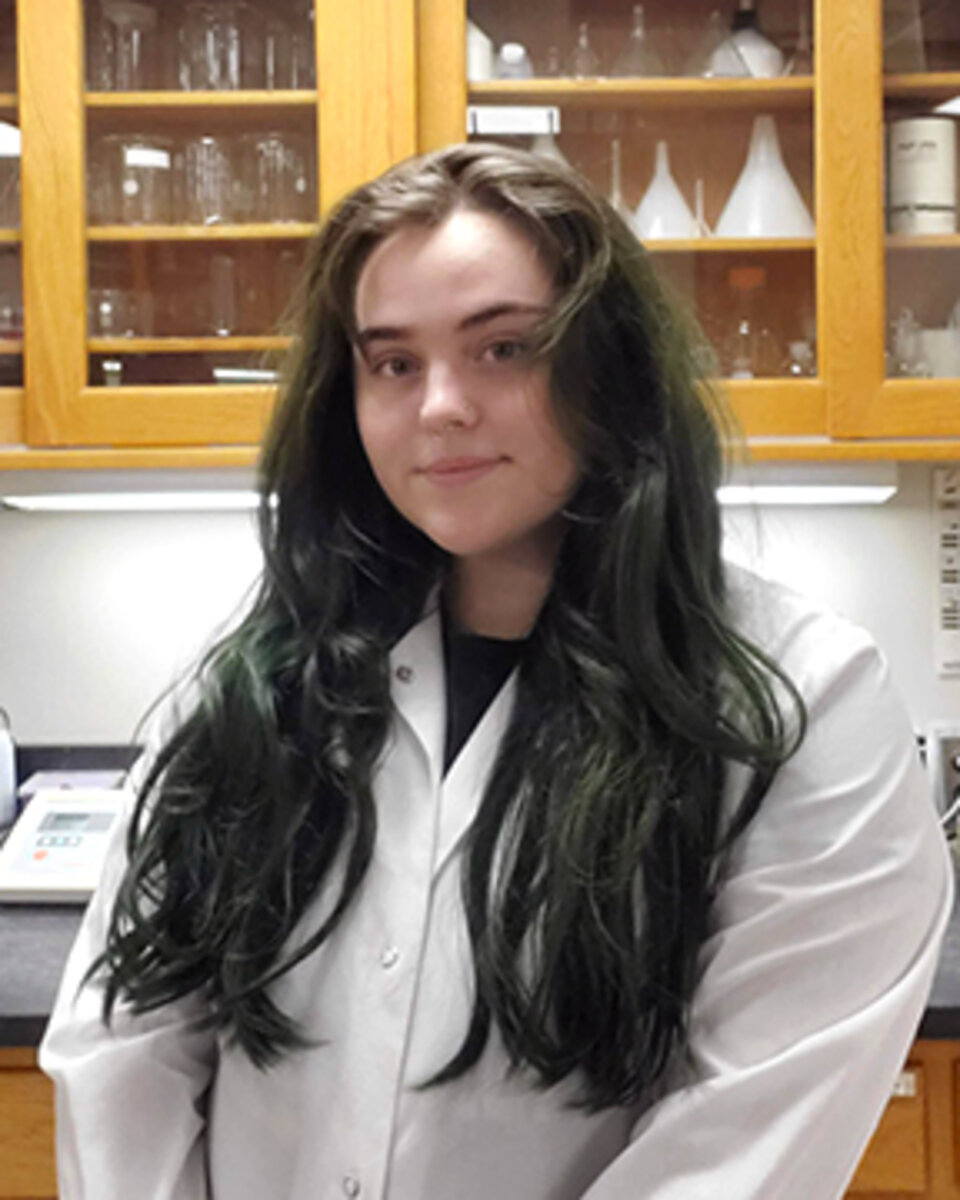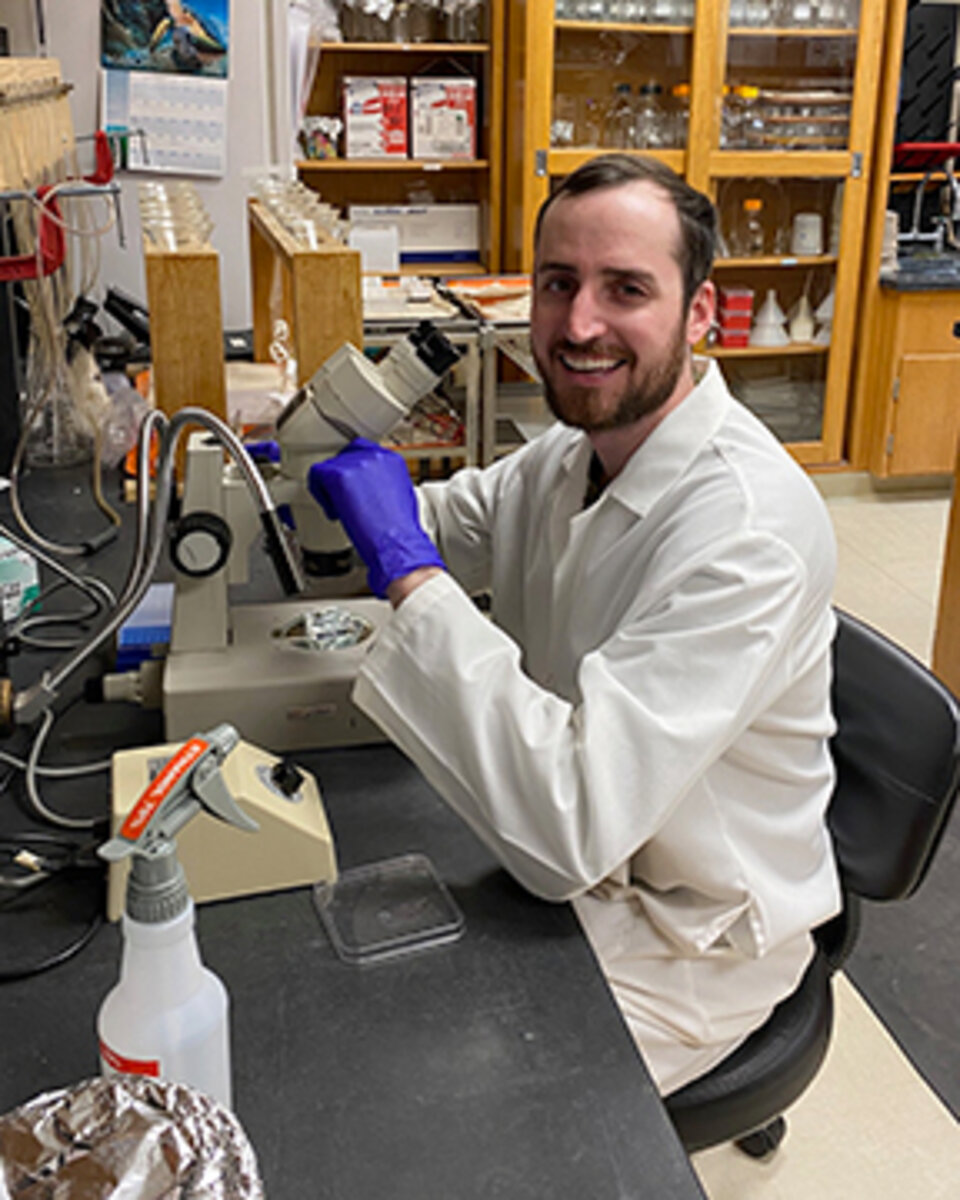Agronomy & Horticulture

Mason Rutgers
Faculty Mentor: Dr. Judith Turk
The effect of soil aggregation state on the accuracy of color-based predictions of soil organic carbon
Soil organic matter is integral to soil productivity and its role in the global carbon cycle, requiring accurate and efficient measurements of stored carbon. Since laboratory measurements of soil organic carbon can be costly, indirect methods of measuring soil organic carbon are ideal. This research project aims to develop predictive equations for soil organic carbon using color measurements.
Recent studies have determined that digital color sensors can accurately predict soil organic carbon. However, no standard sample preparation methodology has been determined. The purpose of this study is to develop predictive equations using aggregated and disaggregated samples, calculating the error associated with each to draw conclusions on the effect of aggregation state in predicting soil organic carbon.
Animal Science

Emily Schulz
Faculty Mentor: Dr. Jessica Peterson
Investigation into the Potential Linkage of Maternal Stress in Polypay Ewes with Congenital Heart Conditions in their Lambs using Differential Gene Expression
Intrauterine growth restriction (IUGR) is a fetal condition typically resulting in low birth weight, underdeveloped muscle mass, and increased insulin sensitivity. Studies have shown maternal stress can induce IUGR leading to detrimental effects on progeny. Recent findings have suggested stress treatment of Polypay ewes may also lead to congenital heart defects. This study aims to identify differential gene expression attributed to maternal stress in the cardiac muscle of fetal lambs utilizing RNA sequencing. This research will provide insight into how maternal stress impacts offspring development. While this study focuses on sheep, maternal stress is of concern in a multitude of livestock breeds. Therefore, this research will not only impact the ovine industry but the agricultural industry as a whole.
Biochemistry

Gabriella Menezes da Silva
Faculty Mentor: Dr. Oleh Khalimonchuk
Assessment of The Role of PQC Proteases in the Mdm38 Complex Stability
The inner mitochondrial (IM) protein Mdm38 has been associated with both membrane protein homeostasis and K+ /H+ ion exchange. Lack of Mdm38 in yeast causes a significant decrease in the mitochondrial membrane potential and altered vacuolar morphology. The human homolog of Mdm38, LETM1, has been considered an essential gene. Its deletion is linked to a multi-systemic Wolf-Hirschhorn Syndrome, and changes in cellular levels and functionality of LETM1 are associated with obesity, tumor development, and seizures. Previous studies also suggest possible interactions between Mdm38 and PQC proteases. This research will include identifying the optimal epitope tag for constructing the tagged version of the protein and further biochemical analysis of the Mdm38 complex including its behavior in response to defects in the mitochondrial protein quality control system.

Jordyn Svoboda
Faculty Mentor: Dr. Georgina Bingham
Tyrosine Detoxification Inhibition to Control Hematophagous Zoonotic Disease
Zoonotic diseases are caused by the transfer of bacteria or viruses between animals and humans, with a common vector being blood-feeding arthropods. As conditions like West Nile Virus and malaria increase in severity and impact multiple aspects of society, we seek to inhibit the blood meal metabolism of insects when their hosts are treated with therapy. Interruption of tyrosine detoxification in blood causes an accumulation of the amino acid and eventual death. This multi-faceted study began with an analysis of drug degradation in the digestive system of cows and will further explore the impact of dosing on stable flies and their hosts, hypothesize alternative therapies, and explore genomic manipulation. Thus, we seek to prevent further transmission by addressing the hematophagous insect rather than treatment once infected.
Biological Systems Engineering

Olivia Farmen
Faculty Mentor: Dr. Greg Bashford
Linear Modeling for Functional Transcranial Doppler Ultrasound
Functional transcranial Doppler ultrasound (fTCD) is a noninvasive technique that evaluates blood velocity change in response to stimuli in the major arteries of the brain. This study will examine whether the functional transcranial Doppler (fTCD) response to a stimulus can be modeled by a statistical linear model that incorporates variables for breathing and heart rate. In a typical fTCD experiment, a simple stimulus is applied while changes in cerebral flow are analyzed. Currently, linear models for fTCD have received very little attention, despite their success in other imaging modalities such as functional magnetic resonance imaging (fMRI). We would like to study whether a linear model can be used to accurately model the cerebrovascular response detected by fTCD.
School of Biological Sciences

Anna Schmit
Faculty Mentor: Dr. J. Dustin Loy
Association of Moraxella bovis genotype with geographic location and host factors in United States cattle
Moraxella bovis (M. bovis) is a bacterium that, when inoculated into the eye, has been found to cause symptoms of Infectious Bovine Keratoconjunctivitis (commonly known as pinkeye) in cattle. This project will address a number of questions which include if the M. bovis bacterium has changed over time, the different genotypes of the M. bovis bacterium and how they may change in relation to the geographic region that they are found in, and whether there is a relationship between the genotype of the M. bovis bacterium and the host factors of the cattle from which the sample came from. This project also aims to address whether one genotype is more infectious than the other.
School of Natural Resources

Ethan Grinder
Faculty Mentor:Dr. Tom Powers
Characterization of Native Entomopathogenic Nematodes in Nebraska
Our research plans are to investigate the genetic and physiological characteristics of native entomopathogenic nematode (EPN) species existing in the soils of western Nebraska. By documenting interactions between native species and commercially available EPNs, we’ll assess possible relationships between native EPNs, soil types, and changes in management practices. These goals can be achieved by characterizing EPNs using DNA barcoding and other testing techniques developed in Dr. Power’s laboratory. Our surveys will extend to corn production areas in the northern Sandhills. Laboratory assays will be established, comparing the infectivity and competition of native species with a new “persistent” commercial strain currently tested in pest management trials. The species will be evaluated according to their ability to control corn root-worms, a major agricultural issue in western Nebraska.